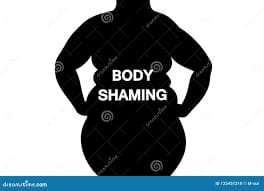By Habibu Temako

In ancient times, people of high moral standards have compelled respect and honor in our society. This was the situation yesterday before right became wrong and conversely. Immorality has been decked in gold, yet the truth has been short-lived. Yet! In the issue of body shaming, we are victims as much as we are the culprits. Sad.
Body shaming, or the act of making critical or derogatory comments about someone’s physical appearance, is a pervasive issue in our current society. It’s described as disagreeable observations in which a person expresses unasked, mostly negative statements about an individual’s physique. The targeted person perceives these remarks as negative, offensive, and body shame-inducing. It takes many forms, including jokes, insensitive remarks, and even outright bullying.
It is also akin to verbal abuse, which can be directed to anyone regardless of their size, shape, or gender. Shame-inducing such as weight shaming, height shaming, and color shaming, all originate from a prejudice and the description of “societal” beauty standards.
Social norms and cultural expectations oftentimes shape beauty standards, which might be firmly rooted in predisposition. People’s self-esteem and mental health can be negatively impacted by biased ideas of beauty, which range from sexist standards that prioritize thinness and average slimness to racist notions of beauty that favor lighter skin tones. Unfortunately, the decisions made under the pressure of these unrealistic standards are oftentimes attractive to backlash. Futile.
For example, the concept of contemporary beauty standards, which value features associated with having lighter skin or at least fairly light, has been deeply ingrained in many societies. As such, many people feel alienated and imposed by these standards, leading to the phenomenon of complexion abuse—such as skin bleaching, plastic surgery, excessive costume and make-up tattoos, etc. All these and more to be free from what the world will say and body derogation.
However, despite efforts to raise awareness about the harmful effects of body shaming, it continues to be a growing phenomenon among young adolescents. Especially in some supposed mature circles where it becomes the subject of ridicule, people are mocked for weight stigma, calling them “too fat” or “too skinny.” In other instances, some are mocked for being under height, calling them “dwarf” or “lanky.” While others are mocked for their skin as “too pale” or “too dark.”
Meanwhile, experiencing offensive remarks or verbal abuse as an adolescent causes stigmatization: thereby inflicting psychological damage and depression on the targeted person. The victims are emotionally struck with guilt-tripping, psychic aggression, and intense self-loathing all because they feel attacked to a feature they can’t undo.
Accordingly, body shaming or shame-inducing in whatever form should be regarded as a serious crime against human dignity, respect,, and honor. As human beings, every person is expected to guard and regard one another and not to denigrate, tease, humiliate, or make jest of one’s hidden failings. Thus, everyone is created with their physical unique features. Alas, should body shaming be morally right, everyone is a victim as much as they are the culprit, for psychologically, no human lives without flaws.
